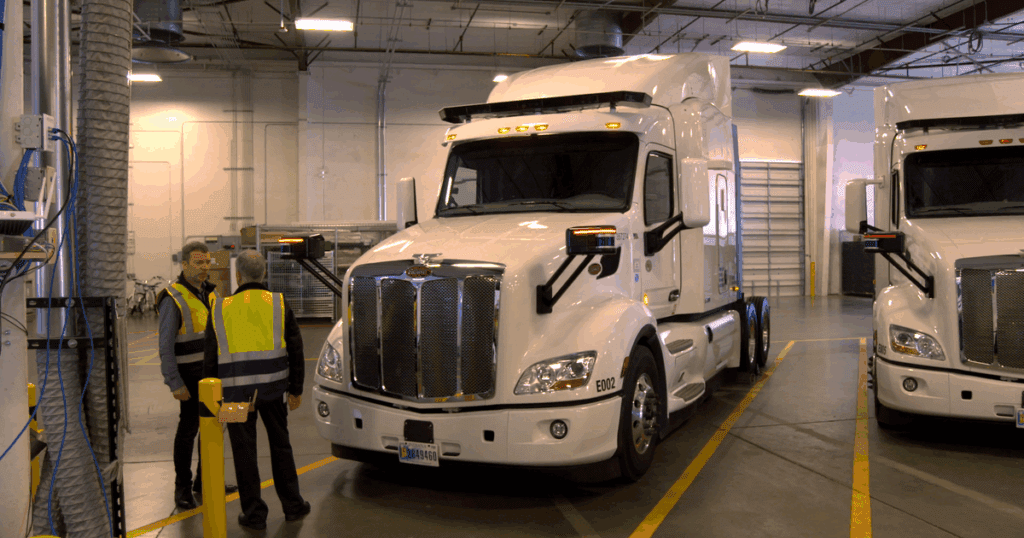The Shift Towards Autonomous Trucks: An Inevitable Future
You might know the classic gesture we make to truckers, hoping they’ll blow their horns. However, you may hear that sound much less frequently in the future, and there’s a solid reason for it: there may soon be no drivers in the cabs. While the focus tends to be on self-driving cars, the reality is that autonomous trucking is a matter of “when,” not “if.” This change is arriving sooner than expected. As previously reported in March, companies have been conducting quiet tests of their prototypes on public roads. Presently, a competitive race is unfolding, with major players like Google and Tesla squared off against smaller startups eager to seize the opportunity. The introduction of driverless trucks is set to transform the trucking industry and impact the daily lives of 2 million American truck drivers. The victorious companies could unlock enormous profits, reshape the U.S. transportation grid, and establish themselves as reigning road leaders.
The Reality of Trucking Today
There’s a romantic notion of the open road in American culture, with 18-wheelers transporting goods across the nation. Truckers are responsible for moving about 70% of the nation’s freight. However, last summer, on a humid Sunday on the Florida Turnpike, Starsky Robotics executed a groundbreaking test: a driverless truck was successfully driven down a busy highway with no one behind the wheel. This marked a significant achievement, as Starsky became the first to operate a truck without human supervision. While other companies still keep a driver on board as a safety measure for now, it’s clear this technology has made significant strides.
Awareness Among Truckers
Despite the advancements in autonomous technology, many truck drivers remain unaware of how far this technology has progressed. In Jacksonville, we spoke with truckers—Jeff Widdows, his son Tanner, Linda Allen, and Eric Richardson—who expressed surprise at the recent developments. Linda noted her fear upon encountering a driverless truck, while others admitted they had no prior knowledge of such advancements. There’s a general consensus that the industry has yet to address this shift.
Testing Ground of Tech Giants
The autonomous truck movement is real, but discussions about it remain scarce among professionals. Companies, like TuSimple—a global player in autonomous trucking—are pushing forward. In the heart of the Sonoran Desert in Tucson, TuSimple manages a fleet of self-driving trucks valued at over a billion dollars. Chief Product Officer Chuck Price anticipates that they’ll conduct driver-free demonstration runs on public roads soon, with technology that includes a network of sensors, cameras, and radar, all managed by an internal AI system.
Safety, Efficiency, and the Future
TuSimple’s autonomous trucks are designed to handle various driving conditions effectively, capable of operating even at night or in the rain. The technology claims to detect obstacles and react more quickly than human drivers. However, the advent of driverless trucks poses a significant threat to the existing $800 billion trucking industry, particularly for truck drivers without college education—posing a risk of substantial job losses. Sociologist Steve Viscelli from the University of Pennsylvania warns that certain types of trucking jobs, specifically in refrigerated and dry van transport, are the most vulnerable.
The Concerns from Current Truckers
For many truckers, the rise of driverless technology raises serious concerns regarding safety and the potential for job loss. They express fears about technical glitches that could result in dangerous situations and question the capability of autonomous systems to navigate complex human interactions on the road. Moreover, there’s growing discomfort about the lack of oversight and communication regarding testing driverless trucks on public roads.
Conclusion: The Road Ahead
While autonomous trucks may promise efficiency and safety improvements—eliminating issues like distracted driving—the transition raises complicated questions about jobs, industry policies, and public safety. As these technologies continue to develop, it’s crucial for all stakeholders, from truckers to tech companies, to engage in meaningful conversations about how to navigate this transformational period in transportation.


